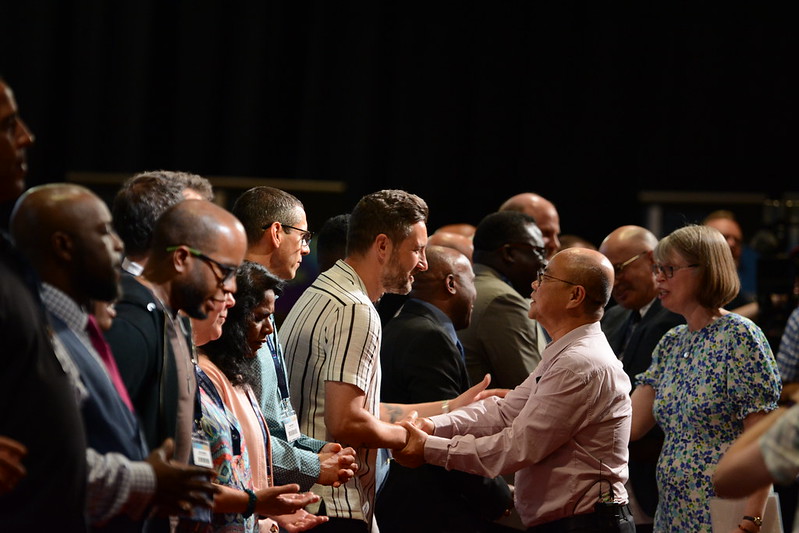Ministerial Recognition

From the very beginning Baptist Christians have held together a belief that all members of a local church are called to share together in the ministry of Christ, but that God calls some individuals to a particular role of ministry in the church. This kind of ministry has often been described, using a word found in the New Testament, as offering ‘oversight’, and as Baptists we have recognised that such people are gifted by God and called to this kind of ministry in a service of ordination. In addition as a Union we keep a list of those called to this ministry – ‘The Register of Covenanted Persons Accredited for Ministry’ – who can be commended with confidence to churches within our Union.
Our culture is changing and the nature of ministry is changing alongside this and as an Association we are committed to the wider Union vision to ‘grow healthy churches in relationship for mission.’ In particular the church is now a minority within our society, increasingly less at the centre of communities and more marginal instead. The church needs to respond to this changing situation in creative missional ways so the kind of role that our ordained and accredited ministers have will include:
-
enabling churches to develop their mission and engagement with their communities
-
encouraging the releasing of the gifts of all the members of the church so that they can engage in the mission and ministry of the church
-
bringing a breadth and depth of understanding to help all grow in their discipleship and walk with God
-
representing the church in the wider community
Being set aside by the church for this kind of ministry is a significant process and it is important for the health and flourishing of our churches that it is done well.
While an individual has their own sense of call to ministry, recognition of this call and gifting will also come from other Baptist Christians. In church meetings and gatherings members recognise and affirm each other’s gifts. A careful and prayerful consideration of a candidate’s potential and call is a vital part of the process since it is within the local church that a gift for ministry is first discerned.
There are two important aspects of this process which might be described as discernment and formation
Discernment
If we believe that God calls some people to this particular ministry, we need to discern those individuals who God is calling so that those we believed God is calling can be encouraged to pursue this calling and those we feel God is not calling to this kind of ministry can be encouraged and enabled to exercise ministry in other ways. The local church has a key role at the beginning (commendation) and the end of this process (calling). For an individual to pursue this kind of ministry There are two important aspects of this process which might be described as discernment and formation 3 they must be first commended by a formal decision of the Church Meeting of the local church where they are a member, and have been a member long enough (normally two years) so that they are well known to the rest of the church. Then at the end of the process of formation an individual must be called by a local church to be a minster in that church in order to be ordained and accredited. In between commendation and calling, others such as Regional Ministers, the Association Ministerial Recognition Committee, and a College, are involved in the discernment process on behalf of the wider Baptist family, but it begins and ends with a local church.
Formation
Part of the process of discerning (outlined later) involves recognising that an individual has God-given gifts necessary to exercise this kind of ministry, that they are beginning to exercise this kind of ministry already and that they are showing some maturity in their character. Alongside this goes a process of preparation which we describe as formation. This will involve elements of learning and of training to do things well, but it is held together in a process of developing to be the kind of people God wants us to be, with the maturity and faith to have oversight in the church. This normally happens through a process of ministerial formation through a Baptist college, but local churches are very involved. Most people preparing for ministry now follow a church based pattern where they are called to exercise ministry on a part-time basis in a local church (whether as part of a team or on their own) and study at a college alongside this. Thus they are exercising ministry as well as preparing for it, and the local church where they minister both receives and welcomes their ministry but also is involved in helping from and shape them for the future.
Who are we looking for?
There is no blueprint for ordained ministry and those called by God are very different, but there will be a number of things that such people have in common, which could be called ‘marks of ministry’. All are called to share in ministry and grow in Christ, but it is important that we look for these kinds of marks in those who are sensing a call to ordained ministry. We are looking for people who show:
 MARKS OF LEADERSHIP MINISTRY CALLING
MARKS OF LEADERSHIP MINISTRY CALLING
Clear evidence of a call that originates from God. This will be supported by personal testimony and attested by other mature Christians who know the candidate well.
A personal maturity and deepening of a candidate’s relationship with Christ. A growing personal Christ-centred, prayerful, biblically informed spirituality which reveals a significant self-awareness and integrates work, church, family and self as a life embodying and lived in relationship with the Triune God.
Clear evidence that a candidate is someone whom others naturally trust and follow.
Clear sense that God’s purposes matter more to a candidate than personal goals and aspirations.
A sense of belonging to the Body of Christ in all its diversity. With pastoral ability to listen effectively, to relate to others who are different, for example, culturally, theologically and to offer appropriate care both to those within and without the church.
A proven ability and adequate humility to listen and learn. Showing ability to think through issues with care and insight, to make connections between the Bible and life in the mission of the church, and help others to think in this way. A necessary prerequisite is the ability to apply experience and learning to new situations.
Measurable leadership potential. Demonstrating ability to offer positive influence in a variety of ways, to work well with others both within and beyond the local church and to help the church to be mission-minded and forward-looking. This will include the ability to communicate both in preaching and in a variety of other contexts.
Tenacity and character in the face of disappointment and struggle.
Fruits of ministry in the here and now Although this will still be at a preliminary stage there should begin to be evidence of the difference a person is making to the wider life of God’s people.
What do we do as a local church?
If there are individual(s) in a church who are sensing that God might be calling them to this kind of ministry or who the church are encouraging to consider this ministry, then a number of thing are important:
-
give these individuals opportunity to exercise ministry in the church, to experience different aspects of ministry, including preaching and leadership, and help them to learn through these experiences;
-
enable these individuals to talk and pray with the ordained minister and / or other key leaders in the church about their sense of calling;
-
encourage and enable these individuals to begin a discernment conversation with the Regional Ministers in the Association;
-
develop a process where the church sensitively and carefully discusses whether these individuals are called to ordained ministry. This needs to include church meetings and happens best as a process. For example there might be discussion over two church meetings with opportunities for all those involved to pray and reflect in between;
-
move to a vote by the church meeting on whether to commend the individual which needs to be recorded carefully in the minutes of the meeting so that this can be sent on to the Association later.
What happens next?
When individuals have had meetings with the Regional Minister and been commended for ordained ministry by their local church the normal process is:
-
the appointment of an ‘accompanier’ – this is someone who will be from outside individual’s church and not part of the formal decision-making process who will be a friend to talk and pray with through the process
-
attending the Partnership Ministerial Recognition Committee, which is a two day residential process
-
if commended then attending an interview at the Baptist college of choice
-
if successful then deciding on the most appropriate course, arranging a placement, completing a DBS enhanced disclosure and being registered with the Baptist Union as a minister-in training
-
beginning at college
Further help
We hope this gives relevant information. Further help and advice will be available from your minister or your
Regional Minister.